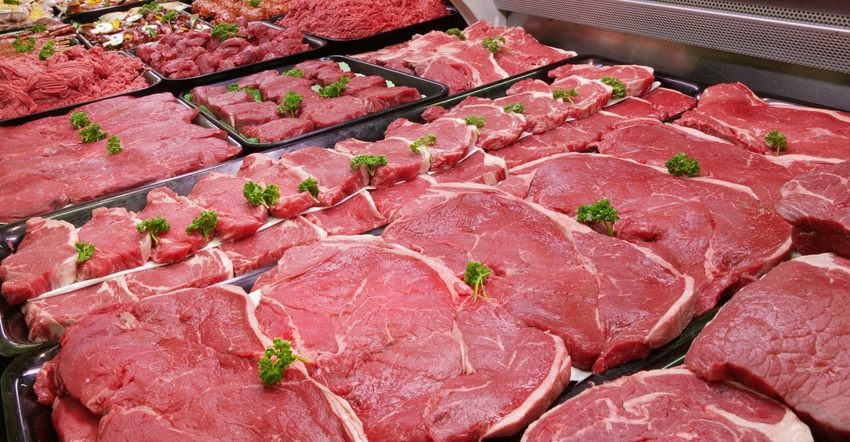
Location. Location. Location. We hear it all the time. Not only when you are buying a house or farm, but also in building processing near the locations where raw materials are grown.
That’s the concept behind a recent announcement by the newly formed Sustainable Beef LLC, a group of cattlemen and investors with deep Nebraska ties seeking to build a small, regional beef processing facility in North Platte.
The announcement of those plans came at a media event March 18. In a news release from Sustainable Beef LLC, the group discussed the reasons for their wishes to build this venture at this time in North Platte.
“During the summer of 2019, the beef industry experienced significant disruption when the beef plant in Holcomb, Kan., had a major fire,” the release stated. “Then, during the spring of 2020, the beef industry again experienced significant disruption due to the COVID-19 pandemic. These events have shown a bright light on the need for more capacity in the beef packing industry.”
Need more capacity
Local McPherson County rancher Rusty Kemp traveled with Gov. Pete Ricketts on trade missions to Japan and Vietnam in 2019. Kemp returned home with the idea that Nebraska beef has high regard around the globe, and there is more processing capacity needed to make sure cattlemen have a place to process their livestock.
The proposed plant would exceed 300,000 square feet and could cost up to $300 million to build, including construction costs and capital improvements with state-of-the-art equipment. The plant would employ about 875 people and would process up to 400,000 cattle per year. With a planned $50 million payroll, the annual estimated economic impact on Lincoln County could top $1 billion.
“The group reached out to Ernie Goss, Creighton University, to do an economic impact analysis of the project,” says Gary Person, president and CEO of the North Platte Area Chamber and Development Corp. “This data just isn’t ‘word-speak’ from the promoters of the project, but from a professional who is renowned nationally.”
Person says that “there is not a type of economic development project that a community could embrace that would have more impact and help more businesses and individuals than this type of project.”
Some have believed that North Platte as a community was in slow decline. Person argues that this old image of the community has changed. “Great Plains Health has become a dominant regional medical center with national and regional accolades for how it has elevated medical care and specialty services,” Person says. “Our interstate business community continues to blossom and grow. We have a resurgence in our downtown with a $4 million public-private investment of new infrastructure, new business facades, expanding businesses and revitalization efforts.”
In a news release from the original March media event, North Platte City Administrator Matthew Kibbon said, “From a strategic standpoint, the project focuses on enhancing the area’s cattle industry, growing the area’s workforce and provides an opportunity to thrive in today’s global economy. These combined will undoubtedly contribute to the current and future successes of North Platte.”
First step
The proposed location for the plant is within a mile of Interstate 80 and adjacent to the city’s wastewater treatment plant. Tax increment financing is a tool used by municipal governments to stimulate economic development, and one that could be used to finance redevelopment projects and investments, such as the Sustainable Beef plant, using anticipation of future tax revenue resulting from the development.
In order for TIF to be used, the 374 acres where Sustainable Beef would hope to build had to be deemed blighted and substandard by the North Platte City Council.
On April 6, the city council took up the resolution to accept a Hanna: Keelon Associates, P.C., Lincoln, Neb., study declaring the property along the east side of Newberry Access as blighted and substandard and eligible for TIF. In a public hearing lasting an hour and twenty minutes, 20 North Platte residents spoke. A majority opposed the designation or expressed concerns and questions, mostly surrounding potential wildlife habitat within the designated property, which also includes a retired lagoon.
City council members each offered their own opinions after the hearing, cautiously favoring taking this first crucial step, but acknowledging the concerns of those in attendance. In the end, council members voted, 8-0, in favor of approving the study and granting the status to the land, making it TIF eligible and allowing the process to move forward.
More steps
City council members noted that the April 6 vote was only one step in the overall process for the property. During the hearing, Person said that he saw no reason that any potential development would necessarily destroy the wildlife habitat that exists on part of the parcel.
While many steps remain in the development process, if those necessary steps fall into place, the Sustainable Beef group hopes to break ground by this fall, with the idea of beginning operations in 2023.
About the Author(s)
You May Also Like






